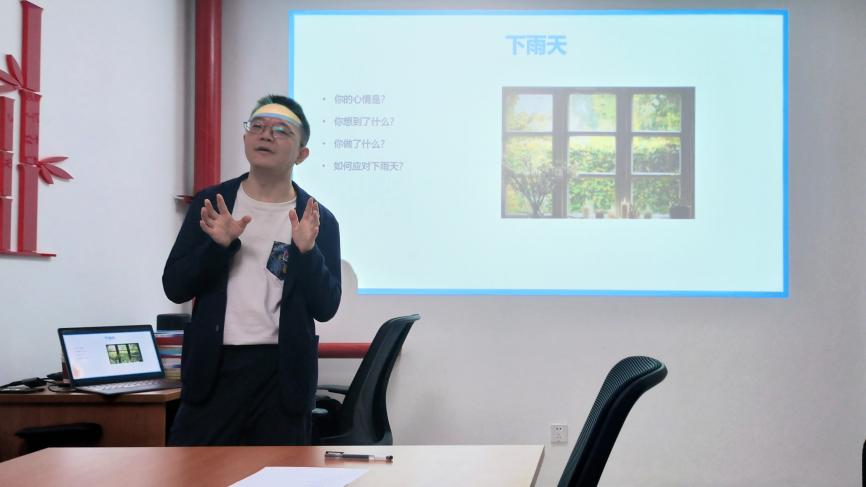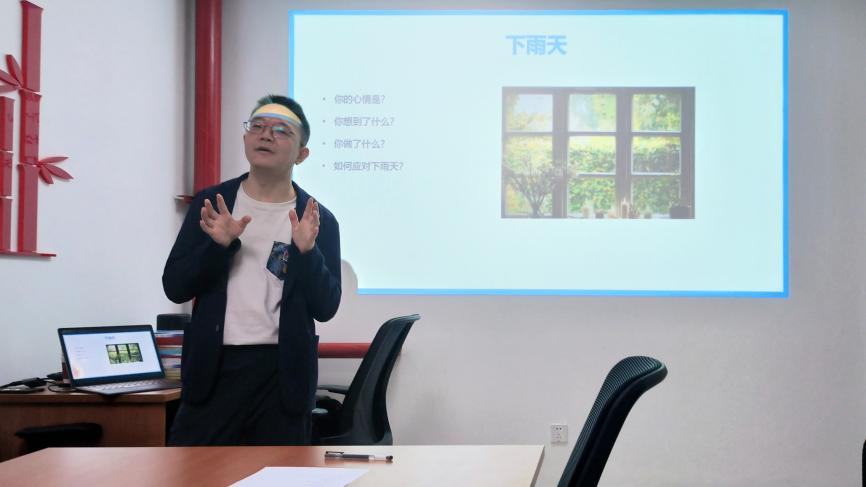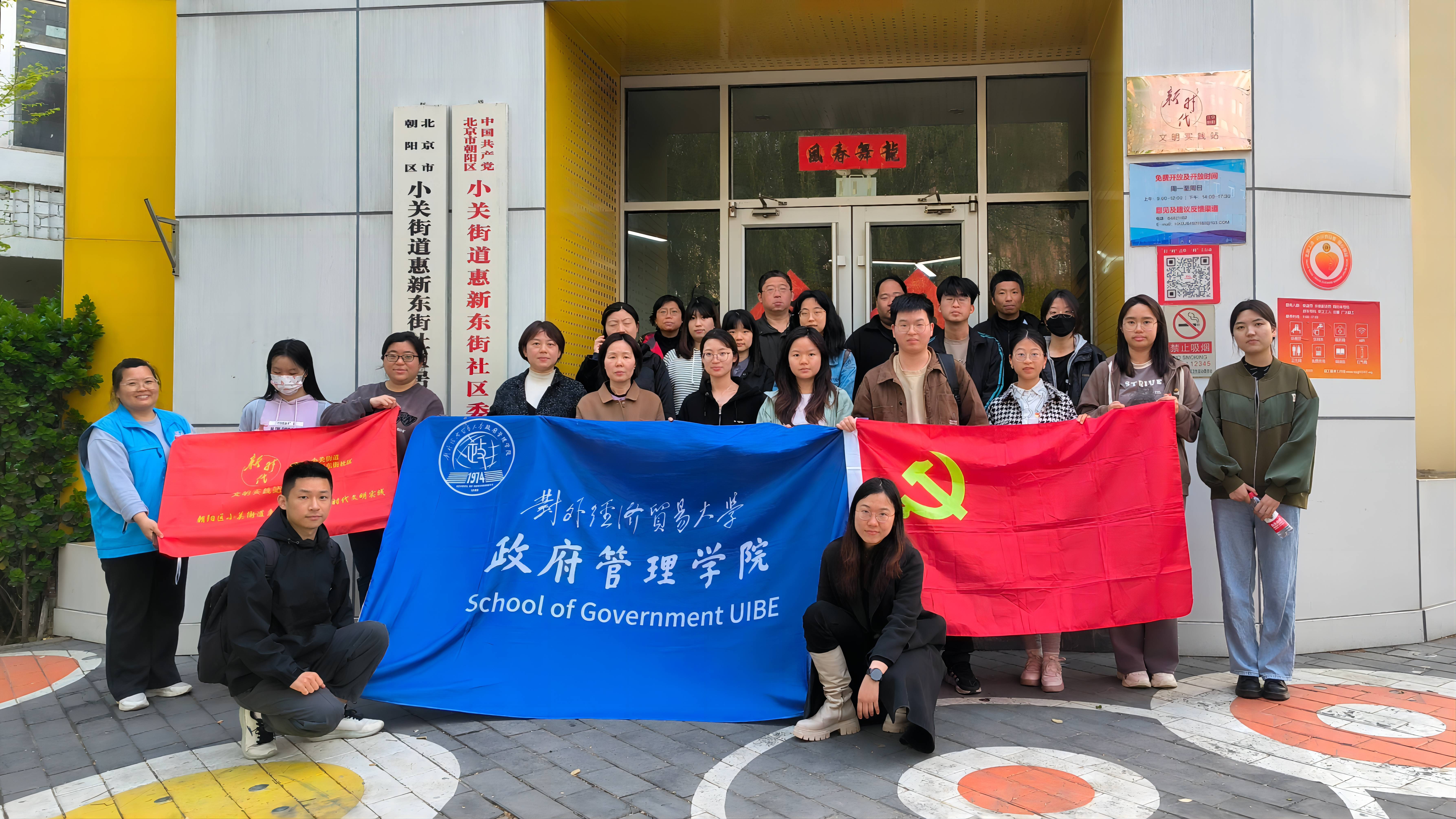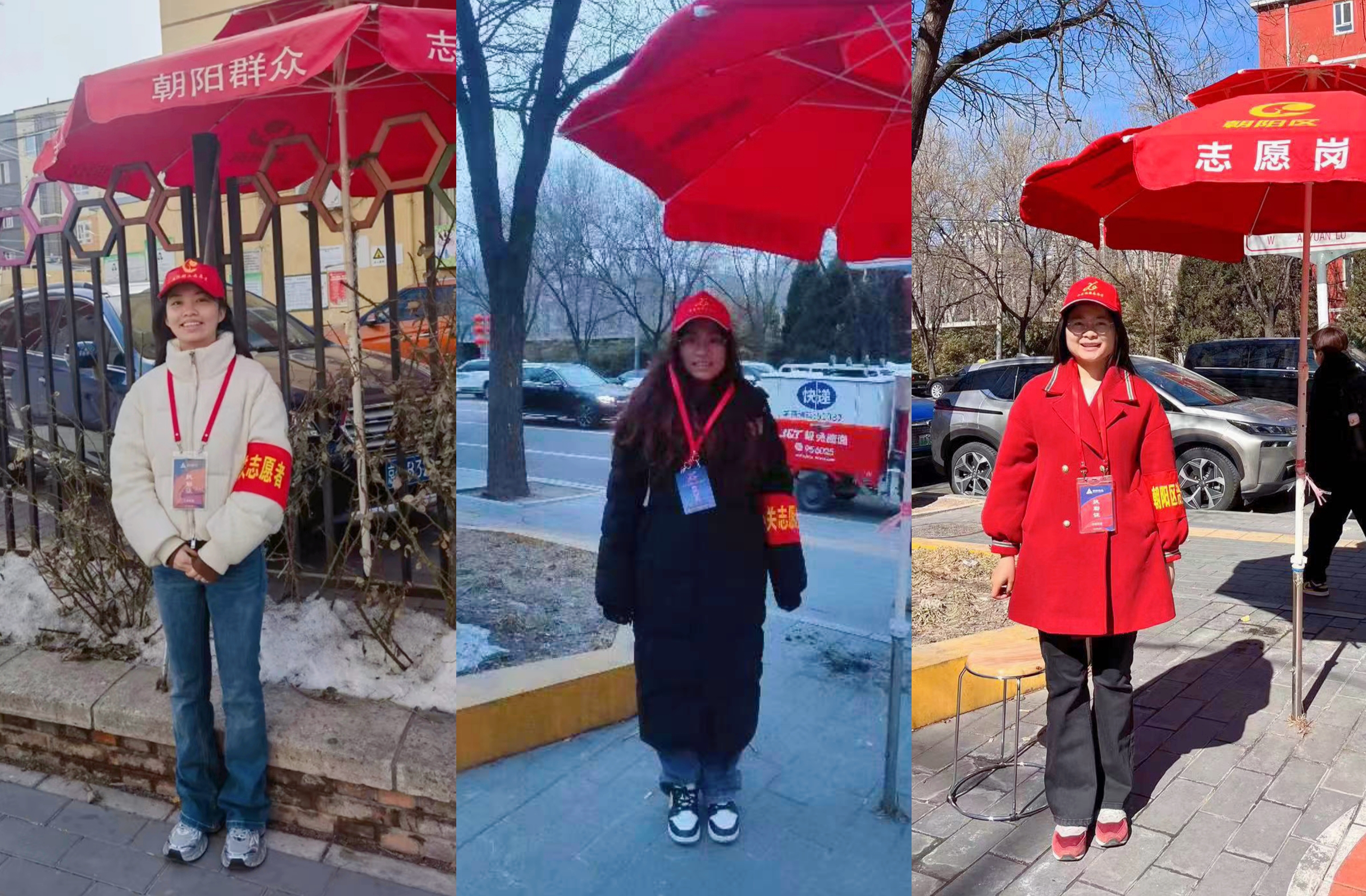-
2024-03-20 开云APP官网入口(中国)开云有限公司召开新任领导干部见面会
-
2024-03-18 司法部行政执法协调监督局致函感谢政管学院冀玮研究员
-
17 Oct “质性与案例研究”科研育人团队再次招新啦!
-
13 Oct 大数据与定量研究科研育人课程大纲
-

Hanchen Jiang, Xiao Tang | Effects of local government social media use on citizen compliance during a crisis
Improving citizen compliance is a major goal of public administration, especially during crises. Although social media are widely used by government agencies across the globe, it is still unclear that whether the use of social media can help local governments improve citizen compliance especially during crises. Based on an original daily panel dataset of 189 cities in China during COVID-19, this study provides empirical evidence for the positive effect that crisis-related social media posts published by local government agencies has on citizen compliance. In addition, this effect is mediated by the topic of prevention measures in social media posts, and is stronger in cities with higher GDP per capita, better educated citizens and wider internet coverage. The findings imply that social media is an efficient and low-cost tool to assist local government agencies to achieve public administration objectives during crises, and its efficacy is largely dependent on regional socioeconomic status.
-

Liu Qing;Lu Ruosi;Lu Yi;Luong Tuan Anh | Import competition and firm innovation: Evidence from China
This paper investigates whether and how import competition affects firm innovation. Using China's World Trade Organization (WTO) accession as a quasi-natural experiment, we find that import competition reduces firm innovation, which is consistent with the Schumpeterian effect. We also find heterogeneous treatment effects across firm productivity and patent types in a way consistent with preference and knowledge spillover effects, but not with escape-competition and trapped-factor effects.
-

江汉臣、卢樱丹、唐啸| 政策宣介中“借鉴发达国家经验”能够提高公众政策支持吗?
改革开放以来,我国重大政策宣介中常出现“借鉴发达国家经验”的提法。但这种宣介方式能否提升公众对该政策的支持度,仍是一个尚未被检验的问题。论文选取房产税政策为研究对象,利用网络调研实验方法,识别发达国家政策信息如何影响公众对国内相关政策的支持度。研究发现:(1)向公众提供发达国家的政策信息并不会显著影响他们对于房产税政策的支持程度;(2)对年轻人和低收入水平的受访者而言,提供发达国家的政策信息,显著降低了他们对于国内房产税政策的支持度;(3)提供发达国家政策信息显著降低了公众对于房产税适合中国国情的判断。研究结果启示决策者在我国未来如房产税、延迟退休、开放生育等重大政策的宣介过程中,须谨慎使用“借鉴发达国家经验”的提法,尤其须注意该提法对不同群体政策支持度的异质性影响。
-

张毅、贺欣萌 | 数字赋能可以纾解公共服务均等化差距吗?——资源视角的社区公共服务价值共创案例
区域间财政资源配置不均衡和资源无法转化为有效公共服务供给,是导致公共服务均等化差距的两个传统因素。本研究以基于智慧社区平台的公共服务合作供给案例,探索性地分析了数字赋能于基层协作创新,在社区切口层次通过金融机构主导的价值共创解决资源配置不均衡和服务供给不足的机制。研究发现:(1)全景式数字平台的整体性界面构建了价值共创主体互动和资源整合的应用场景。(2)数字界面的高频公共服务可以强化异质性资源的依存性,降低价值共创的外部性,形成价值增值共享的内部网络。(3)依托数字平台的价值共创可以纾解公共服务均等化差距。
-
 汤姆·克里斯滕森教授召开Administrative burden - necessary or biased?主题讲座为提升师生科研和学术论文写作能力,2024年3月11日下午,开云APP官网入口(中国)开云有限公司特邀挪威奥斯陆大学政治学系荣休教授汤姆·克里斯滕森开展《Administrative burden - necessary or biased?》的主题讲座。会议由开云APP官网入口(中国)开云有限公司国际事务办公室主任徐萌萌主持,高照钰老师、江汉臣老师、甘甜老师、王云老师和中外博士研究生参与了讲座。
汤姆·克里斯滕森教授召开Administrative burden - necessary or biased?主题讲座为提升师生科研和学术论文写作能力,2024年3月11日下午,开云APP官网入口(中国)开云有限公司特邀挪威奥斯陆大学政治学系荣休教授汤姆·克里斯滕森开展《Administrative burden - necessary or biased?》的主题讲座。会议由开云APP官网入口(中国)开云有限公司国际事务办公室主任徐萌萌主持,高照钰老师、江汉臣老师、甘甜老师、王云老师和中外博士研究生参与了讲座。 -
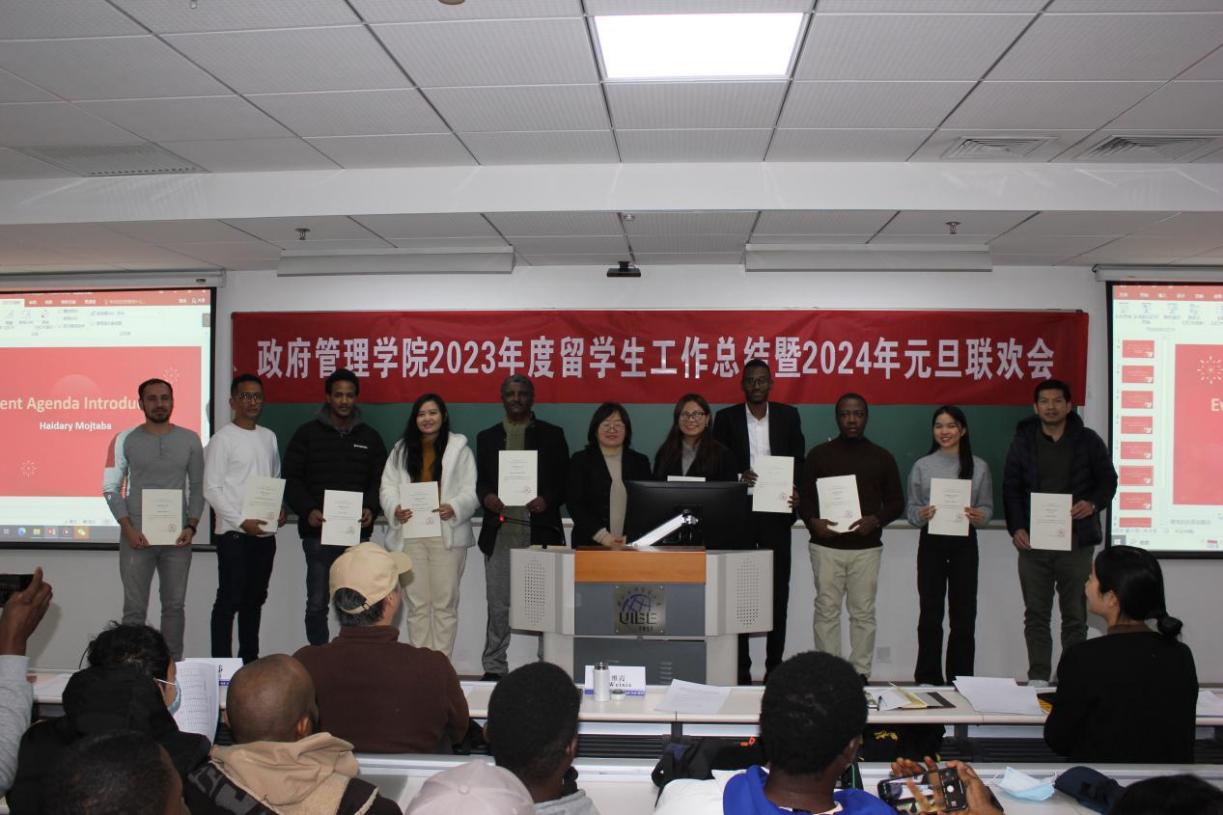 开云APP官网入口(中国)开云有限公司举办2023年度留学生工作总结暨2024年元旦联欢会12月28日,开云APP官网入口(中国)开云有限公司举办2023学年留学生工作总结暨2024年元旦联欢会。开云APP官网入口(中国)开云有限公司副院长吕维霞、院长助理邹伟康、公共经济系党支部书记吴伟、国际事务办公室主任徐萌萌及全院在校留学生参加。此次会议由徐萌萌主持。
开云APP官网入口(中国)开云有限公司举办2023年度留学生工作总结暨2024年元旦联欢会12月28日,开云APP官网入口(中国)开云有限公司举办2023学年留学生工作总结暨2024年元旦联欢会。开云APP官网入口(中国)开云有限公司副院长吕维霞、院长助理邹伟康、公共经济系党支部书记吴伟、国际事务办公室主任徐萌萌及全院在校留学生参加。此次会议由徐萌萌主持。 -
 开云APP官网入口(中国)开云有限公司2023级来华留学生开学典礼顺利举行2023年9月25日,在喜迎中秋与国庆双节之际,对外经济贸易大学开云APP官网入口(中国)开云有限公司2023级来华留学生开学典礼在诚信楼国际会议厅成功举办。出席典礼的有对外经济贸易大学校长赵忠秀,国际学院院长刘金兰,开云APP官网入口(中国)开云有限公司院长李明、副院长吕维霞,开云APP官网入口(中国)开云有限公司本硕博授课教师以及2023级来华留学生。典礼由开云APP官网入口(中国)开云有限公司院长李明主持。
开云APP官网入口(中国)开云有限公司2023级来华留学生开学典礼顺利举行2023年9月25日,在喜迎中秋与国庆双节之际,对外经济贸易大学开云APP官网入口(中国)开云有限公司2023级来华留学生开学典礼在诚信楼国际会议厅成功举办。出席典礼的有对外经济贸易大学校长赵忠秀,国际学院院长刘金兰,开云APP官网入口(中国)开云有限公司院长李明、副院长吕维霞,开云APP官网入口(中国)开云有限公司本硕博授课教师以及2023级来华留学生。典礼由开云APP官网入口(中国)开云有限公司院长李明主持。 -
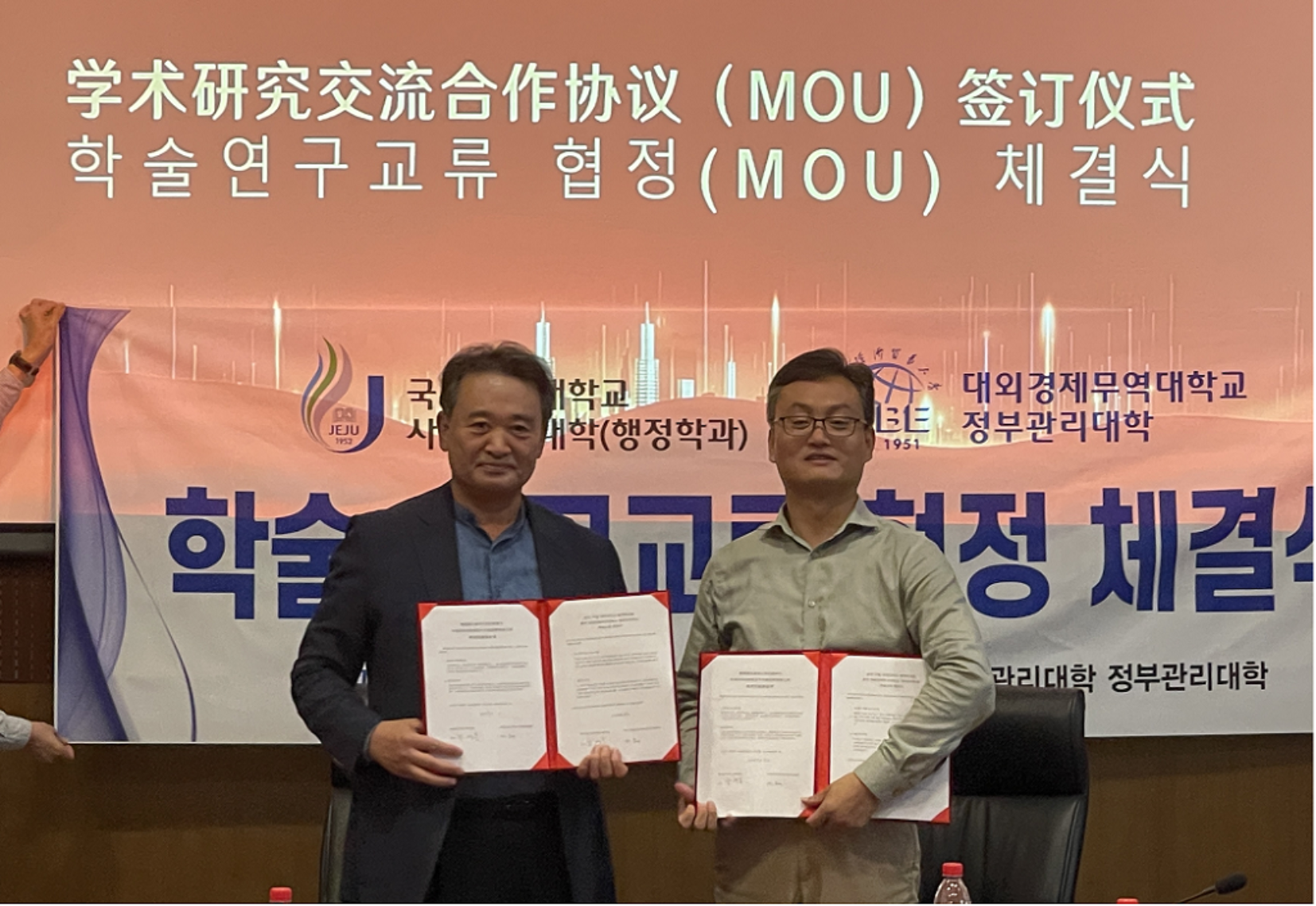 开云APP官网入口(中国)开云有限公司与韩国济州大学社会科学学院行政学系学术交流合作协议签订仪式取得圆满成功2023年9月9日上午,对外经济贸易大学开云APP官网入口(中国)开云有限公司与韩国济州大学行政系在行政楼226会议室举行学术交流会。参加此次学术交流会的有:开云APP官网入口(中国)开云有限公司李明院长、吕维霞副院长、邹伟康院长助理以及崔景华、范静波、程波辉、金仁仙、徐萌萌等教师及数十位在读博士生;济州大学Kang, Young-Hoon院长、Kim, Ju-Kyong副院长、Kim, HyoungAh助理教授及两位在读博士生。
开云APP官网入口(中国)开云有限公司与韩国济州大学社会科学学院行政学系学术交流合作协议签订仪式取得圆满成功2023年9月9日上午,对外经济贸易大学开云APP官网入口(中国)开云有限公司与韩国济州大学行政系在行政楼226会议室举行学术交流会。参加此次学术交流会的有:开云APP官网入口(中国)开云有限公司李明院长、吕维霞副院长、邹伟康院长助理以及崔景华、范静波、程波辉、金仁仙、徐萌萌等教师及数十位在读博士生;济州大学Kang, Young-Hoon院长、Kim, Ju-Kyong副院长、Kim, HyoungAh助理教授及两位在读博士生。






